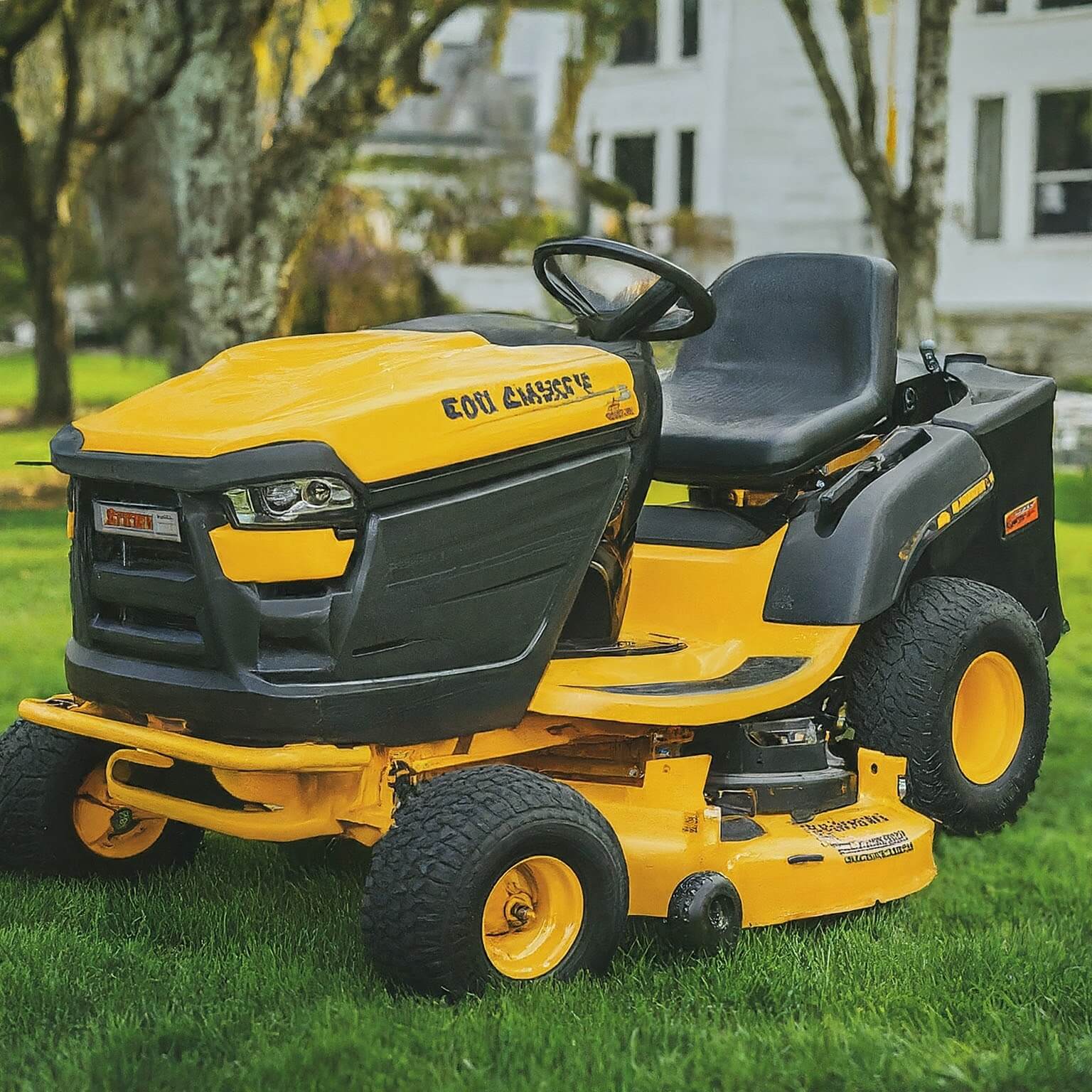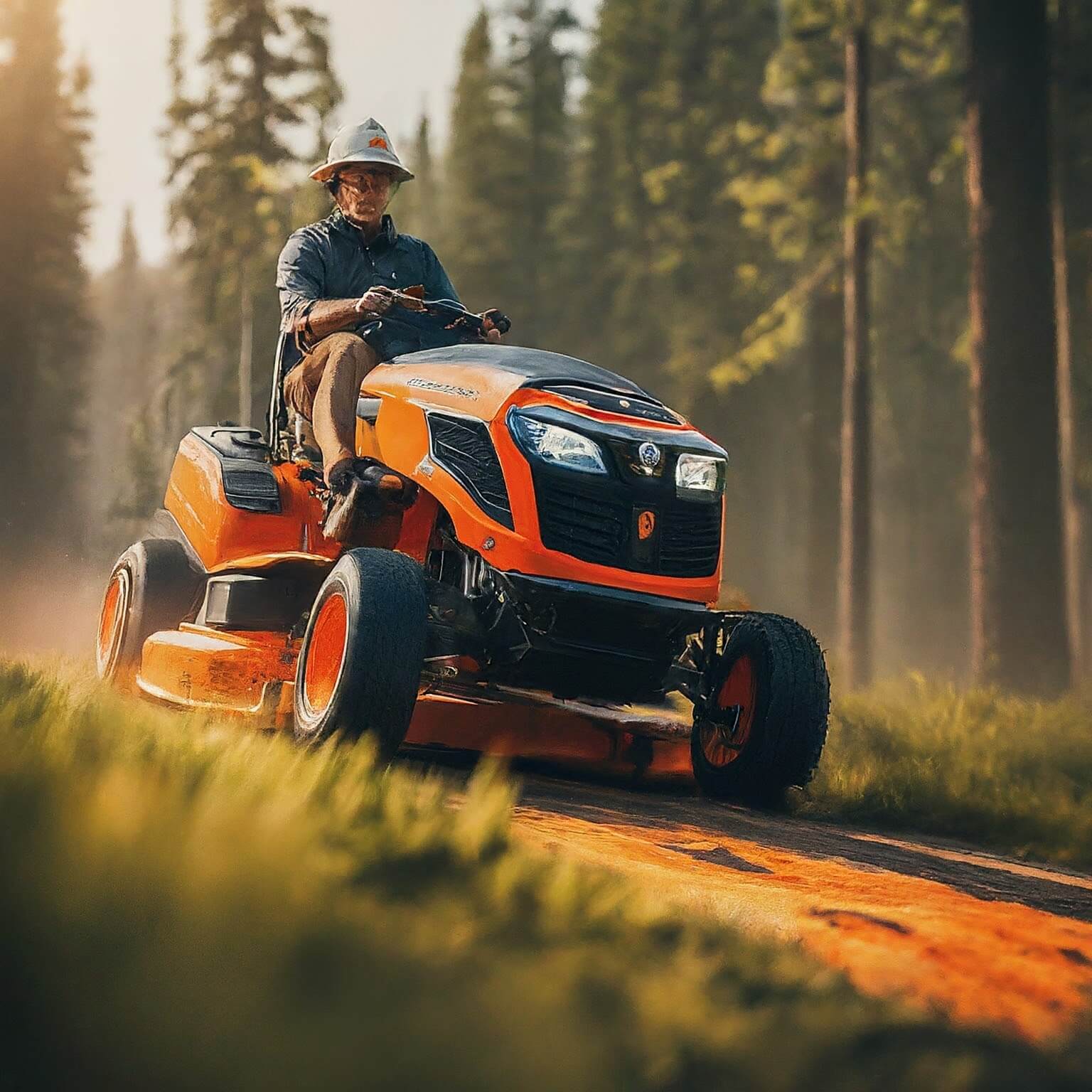Cub Cadet, John Deere, and Husqvarna are three of the top brands for residential lawn tractors. But you are confused which one is best for you, so don’t worry because here we do the complete comparison of cub cadet vs john deere vs husqvarna.
Cub Cadet vs John Deere vs Husqvarna
Now we’re going to do the comparison of cub cadet vs Husqvarna vs John Deere one by one providing their key features and many other things.
Cub Cadet: Power, Durability, and Variety

Cub Cadet stands out for its commitment to power, durability, and smooth operation in the realm of lawn tractors. This brand offers a diverse line-up ranging from basic models to heavy-duty options. While the initial cost might be higher, many users find it to be a worthwhile investment due to the brand’s perceived value for money. One notable advantage is Cub Cadet’s strong dealer support network, ensuring assistance when needed.
Also read How to check hydrostatic transmission fluid on a cub cadet?
Cub Cadet Models and Specs:
- XT1 and XT2 Models: These entry-level models come with lower horsepower, suitable for basic residential needs.
- XT3: This series offers more power and introduces additional comfort features to enhance the mowing experience.
- ZT1/ZT2 Zero-Turn Mowers: For those seeking enhanced manoeuvrability, Cub Cadet provides zero-turn mowers for efficient and precise navigation.
- Tank Series: Cub Cadet’s Tank series represents the epitome of residential performance, catering to users with demanding mowing requirements.
Cub Cadet Engine Options:
Engine Families:
Cub Cadet categorizes its engines into three main families, each catering to specific applications:
- Kohler Engines: Known for their durability and reliability, these engines are often found on Cub Cadet’s mid-range and premium riding mowers and zero-turn mowers. Popular Kohler options include:
- Command Series: Delivers reliable power and smooth operation for everyday mowing tasks.
- Courage Series: Offers higher horsepower and torque for tackling larger yards and tougher terrain.
- Cub Cadet Branded Engines: These engines are designed and manufactured by Cub Cadet and offer a balance of performance and affordability. They are common on their entry-level and value-oriented models.
- Briggs & Stratton Engines: Cub Cadet utilizes some Briggs & Stratton engines on selected models, known for their fuel efficiency and ease of maintenance.
Cub Cadet Transmission Types:
The brand offers a variety of transmission types, including hydrostatic, gear, and automatic options. The emphasis on smooth and variable speed control ensures an enjoyable mowing experience. Furthermore, these transmissions are known for their durability and maintenance-free operation, adding to the overall reliability of Cub Cadet lawn tractors.
John Deere: Reliability and Broad Range

John Deere has secured its position as a top brand, celebrated for reliability and overall performance in the realm of lawn tractors. The brand caters to a broad spectrum of users, offering models ranging from affordable options to heavy-duty machines. While the construction quality is commendable, it’s essential to note that John Deere’s average pricing tends to be higher, justified by the brand’s strong resale value over time.
Also read What is John Deere and It’s All Models
John Deere Tractor Model Highlights:
- D100-D150 Series: Tailored for basic mowing needs, this series provides reliable performance for standard residential usage.
- E100-E180 Series: Offering more features and increased power, these models cater to users with additional requirements.
- X300-X500 Series: Representing the most powerful home models, this series is designed for users with extensive mowing demands.
John Deere Engines and Specs:
Engine Families:
John Deere categorizes their engines into several families, each catering to specific applications:
- PowerTech™: These are the workhorses, offering a wide range of power outputs (from 22.4 to 215 hp) for tractors, construction equipment, and generators. They prioritize durability and reliability.
- PowerTech™ PWS: Designed for industrial applications like skid steer loaders and compact excavators, these engines offer compact size and high torque for demanding tasks.
- PowerTech™ E: These are the fuel-efficient options, ideal for mowers, compact tractors, and utility vehicles. They offer a balance of power and economy.
- Final Tier 4 (FT4): These engines meet the latest emission standards and are available in a variety of power outputs for tractors, combines, and other agricultural equipment.
Key Specs to Consider:
When choosing a John Deere engine, consider these key specifications:
- Horsepower (HP): This indicates the engine’s power output. Higher HP is needed for heavier tasks and larger equipment.
- Torque: This measures the engine’s pulling power, crucial for overcoming resistance and powering through tough jobs.
- Displacement (cc): This indicates the engine’s size and relates to its fuel consumption and power potential.
- Fuel Type: John Deere engines run on diesel, gasoline, or propane, depending on the model.
- Features: Some engines offer additional features like electronic fuel injection, turbocharging, or emission control systems.
John Deere Transmission Options:
John Deere provides a range of transmission choices, including hydrostatic and gear options. The emphasis on smooth variable speed control is a hallmark of the brand, and certain models feature 2-pedal foot control for added convenience.
You may also read this Kubota vs John Deere Sub-Compact Tractors: Which One Best
Husqvarna: Performance, Quality, and Value Pricing

Husqvarna is known for making good lawn tractors. They offer different models for different needs and preferences. One thing to note is that Husqvarna’s tractors are reliable and cost less than John Deere’s. Also, it’s easy to find parts for Husqvarna tractors, making it a good choice for users.
Husqvarna Tractor Models and Features:
Model Lineup:
Husqvarna categorizes its tractor models into three main series:
- 1. TS (TimeSaver): Ideal for small to medium-sized lawns (up to 2 acres), these compact tractors offer manoeuvrability and ease of use. Popular models include:
- TS 142T: A user-friendly option with a 42-inch cutting deck and hydrostatic transmission.
- TS 242T: A step-up with a 42-inch deck, more powerful engine, and LED lights
- TS 342: Features a wider 46-inch deck and integrated 320L collector for convenient grass bagging.
- 2. TC (Terrain): Designed for medium to large lawns (up to 3 acres), these tractors offer increased power and cutting width for handling bigger challenges. Key models include:
- TC 242TX: Boasts a comfortable ride with cruise control, a 42-inch deck, and a powerful V-twin engine.
- TC 342TX: Upgrades to a 46-inch deck and integrated 320L collector for efficient bagging.
- TC 350TX: The top-of-the-line TC model, featuring a spacious 54-inch deck and powerful Kohler engine.
- 3. YTH (YardTractor): These are the heavy-duty machines for large estates and demanding tasks. The YTH X25 is the sole model, offering a massive 60-inch deck, a powerful Kohler engine, and premium features like cruise control and power steering.
Husqvarna Tractor Features:
Beyond model variations, Husqvarna tractors share several common features that contribute to their overall appeal:
- Hydrostatic transmission: Provides smooth, pedal-controlled speed adjustments for effortless operation.
- Comfortable seating: Adjustable seats with armrests ensure a pleasant ride, even during long mowing sessions.
- Durable decks: Fabricated from reinforced steel for longevity and reliable performance.
- Variety of cutting options: Choose from side discharge, mulching, or bagging capabilities depending on your preference.
- User-friendly controls: Intuitive controls placed within easy reach for convenient operation.
- Wide range of attachments: Expand your tractor’s versatility with snowblowers, spreaders, and dethatchers (availability may vary by model).
Husqvarna Engines and Specs:
Engine Families:
Husqvarna categorizes its engines into two main families:
- X-Torq Engines: Designed for maximum torque and efficiency, these engines power most Husqvarna lawn tractors and zero-turn mowers. They feature:
- Advanced cylinder design: Optimizes air intake and fuel combustion for cleaner burning and more power.
- Automatic choke: Starts easily in any weather condition.
- Low vibration: Ensures a smoother ride and operator comfort.
- Professional Series Engines: These heavier-duty engines are used in Husqvarna’s top-of-the-line tractors and commercial equipment. They boast:
- Cast iron cylinder liners: Enhance durability and lifespan.
- Full pressure lubrication: Ensures optimal engine protection.
- Higher torque and horsepower: Tackle demanding tasks with ease.
Key Specs to Consider:
When choosing a Husqvarna engine, consider these key specifications:
- Horsepower (HP): Ranges from 14 HP for compact tractors to 27 HP for professional models. Higher HP indicates more power for towing attachments or handling larger areas.
- Displacement (cc): Varies depending on the engine model. Larger displacement generally translates to more power and torque.
- Torque: Indicates the engine’s pulling power, crucial for powering through thick grass or inclines.
- Fuel Type: Most Husqvarna engines run on gasoline, but some professional models offer diesel options.
- Features: Look for features like electronic fuel injection, air filters, and oil filters that contribute to performance and engine lifespan.
Husqvarna Transmission Types:
The standard transmission type for Husqvarna is hydrostatic, ensuring smooth variable forward/reverse speeds. Known for their reliability and low-maintenance operation, these transmissions contribute to the overall durability of Husqvarna lawn tractors.
John Deere vs Husqvarna Vs Cub Cadet Engine Comparison
| Feature | Cub Cadet | John Deere | Husqvarna |
| Engine Families | Kohler, Cub Cadet Branded, Briggs & Stratton (limited) | PowerTech, PowerTech PWS, PowerTech E, Final Tier 4 | X-Torq, Professional Series |
| Horsepower Range | 14-30 HP | 22.4-215 HP | 14-27 HP |
| Focus | Balance of performance & affordability | Durability & reliability | Innovation & maneuverability |
| Key Specs to Consider | HP, torque, displacement, fuel type, features | HP, torque, displacement, fuel type, features | HP, torque, displacement, fuel type, features |
| Known Pros | Reliability, value, innovative features | Durability, legendary reputation, extensive service network | User-friendly features, maneuverability, fuel efficiency |
| Known Cons | Build quality might not match John Deere, parts network not as extensive | Higher price point, less innovative | Focus on innovation might impact durability |
| Warranty | Varies by model and engine family | Varies by model and engine family | Varies by model and engine family |
| Service Network | Wide network of dealers | Extensive network of dealers | Growing network of dealers |
| Parts Availability | Readily available through dealers and online retailers | Readily available through dealers and online retailers | Readily available through dealers and online retailers |
Key Factors in Choosing Between Brands
Choosing the right lawn tractor involves considering several key factors that align with individual preferences and requirements:
- Cutting Width, Engine Power, and Transmission Type: Evaluate these fundamental aspects based on your specific mowing needs.
- Comfort Features: Consider additional features like cruise control or suspension for a more comfortable and enjoyable mowing experience.
- Budget, Brand Reputation, and Local Dealer Support: Account for these factors to make an informed decision that aligns with your long-term satisfaction.
Also read the 7 Worst Zero Turn Mowers Brands to Avoid in 2024
Husqvarna Vs Cub cadet vs John deere: Recommendations for Choosing the Best Model
To ensure you make the best choice when selecting a lawn tractor, follow these recommendations:
- Assess Your Yard: Consider the size, terrain, and specific mowing needs of your yard.
- Prioritize Features: Select models based on key features that align with your preferences and requirements.
- Compare Pricing and Warranty: Ensure the selected model offers the best value for your investment by comparing pricing and warranty details.
- Consider Dealer Proximity: Check the proximity of dealers to ensure convenient service and support when needed.
Conclusion:
As you see here we do the complete comparison of cub cadet vs john deere vs Husqvarna. Based on this comparison, you choose which one is best for you.








